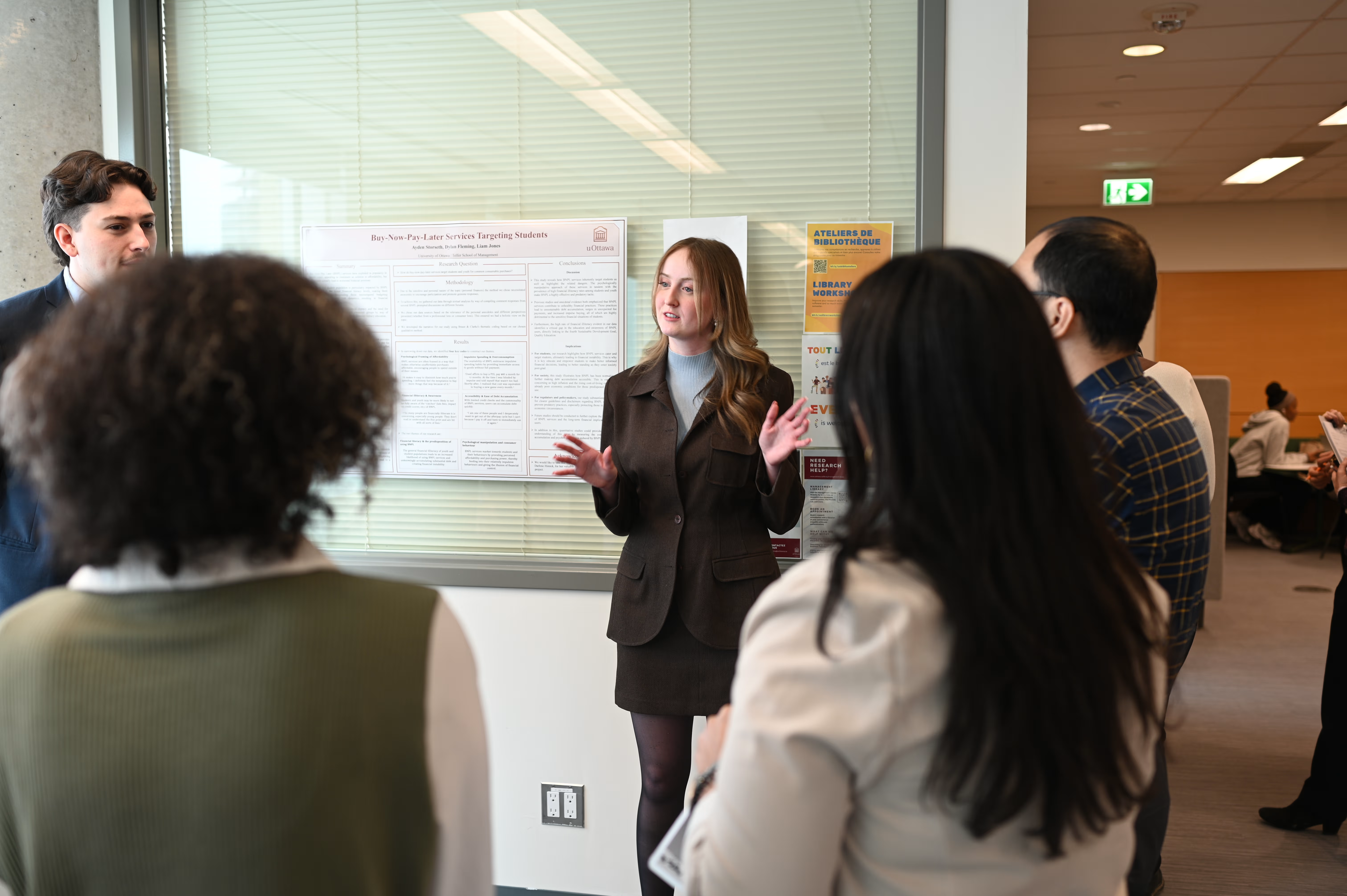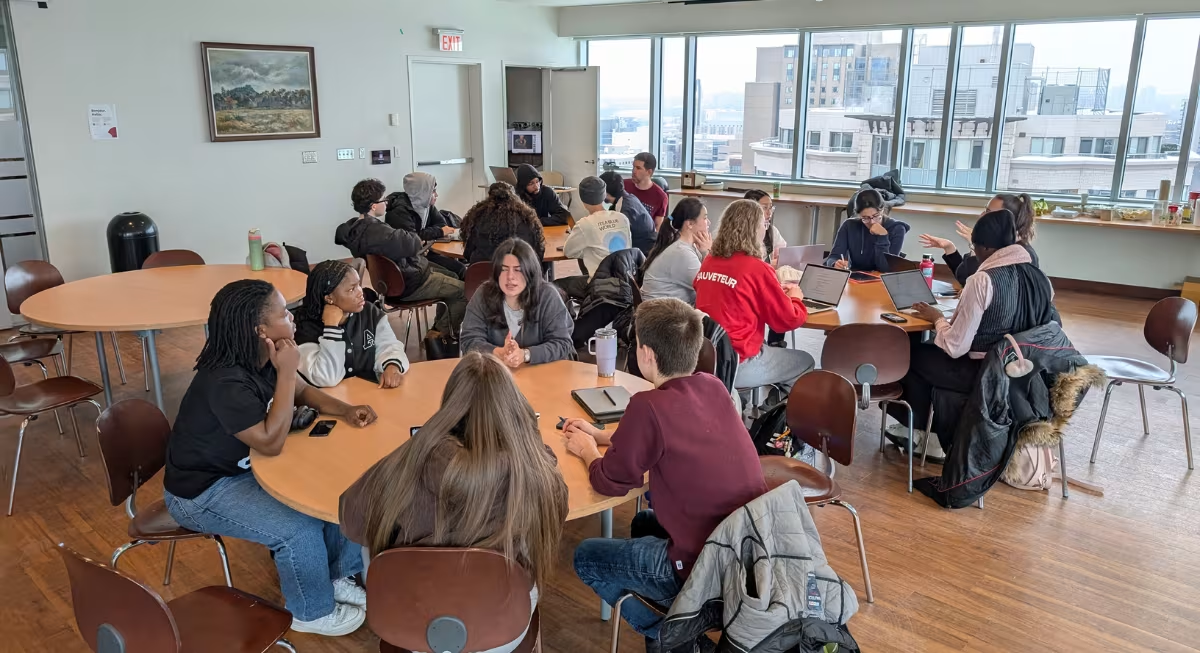
by J.D. Sterne
4th-year BCom student
I will walk you through the exact study tips that I used to earn thousands of dollars in scholarships at Telfer.
If you make the Dean’s List at Telfer, our school will pay you $1,000 per semester that you complete. There are only two things you need to be to get on our Dean’s List.
You need to be organized
You need to be efficient
To serve you best, I have broken this blog down into two sections.
Section A: I will give you the best organization tips so you can be efficient.
Section B: I will give you the best efficiency tips to help you get scholarships.
SECTION A: ORGANIZATIONAL STUDY TIPS
Study Tip #1: Organization is Paramount
Let’s get the ultimate advice out there first; this is the most important of any study tips I could offer. Getting yourself organized is over half of the battle. Sure, you can get by without preparation, but no one ever excelled at anything worthwhile by simply showing up. Remember that for everything you wish to excel at in life.
Study Tip #2: Know Your Course Deliverables (A.K.A. What You Need to Complete to Pass the Course)
If you only accomplish one thing in your first week of the semester, it’s most important that you download and read your course outlines. Take a look at how your professors will be grading you. When are your deliverables due? How much is each deliverable worth? Time is limited. Spend your time according to the weight of the deliverable.
Study Tip #3: Write Down Your Deliverable Due Dates Somewhere You Regularly Look
Now that you know what you have to do and when you have to do it, write it down somewhere that you check on a regular basis. I prefer to see my entire semester at a glance. I created a basic Excel spreadsheet with all of my important due dates and project weights. Here is an example of what that might look like:
Study Tip #4: Set Your Own Deadlines to Minimize Your Future Stress Load
Just because the course outline says it’s due November 5th, doesn’t mean you should be finishing it at 11:00 p.m. on November 5th. It’s the beginning of the semester right now. You’ve planned your semester like a boss, and you know exactly what you need to deliver and when to deliver it. For example, if you see that you have two midterms and an assignment due on the same weekend, you should finish your assignment weeks ahead of time. Doing so will allow you to focus that week preparing for your midterm exams.
Study Tip #5: Set Goals and Plan Your Time Accordingly
Every Sunday, you should write down all of your goals for what you would like to accomplish for the week ahead. What due dates are coming up? Set an expectation of what you will complete on each day of the week. Your expectations will change, so you should update tomorrow’s objectives every night to ensure you can achieve your weekly goals.
Study Tip #6: Create a Facebook Group and Invite Your Classmates
The worst feeling in university is feeling alone – like you’re the only one that has been battling with question 5-C for the last 3 hours…this is avoidable. I wrote an article on How to Start a Conversation in 4 Steps on my personal blog. Here’s a perfect way to break the ice and get to know your classmates. “Hey! What’s your name? I’m starting a Facebook group for our class where we can all help each other with challenging problems. Would you like me to add you? You can add your friends too.” Boom… just like that, you have your first friend in the class!
SECTION B: EFFICIENCY STUDY TIPS
Study Tip #7: Pay Attention to How Your Professor Allocates Time in Class
If your professor spends a significant amount of time on one chapter or sub-section of a chapter, it’s usually not a coincidence. It’s because it’s more important. You should focus more time on those components when preparing for your exams.
Study Tip #8: Find Old Midterm/Final Exams A.S.A.P.
The best thing you can do is (ethically) get your hands on some old exams to see what past students were tested on. In my experience, a significant number of exams I’ve written have been similar to past exams. These old exams may help you distinguish early in the semester the content that is nice to know versus the content that you need to know.
Study Tip #9: Create Practice Exams Based on Your Estimations
Create a practice exam with all of the questions that you estimate will be on the real exam. What types of questions did they ask on the past exams you found? What format does the course outline say the exam will follow? What has your professor spent a lot of time discussing in class? These are the types of questions you can use to form your own mock exam. Don’t be afraid to ask your professor what’s on the exam as they may provide tips. Build this exam throughout the semester. This way you can focus on understanding the answers during the exam-study period.
Study Tip #10: Create an Ever-Growing Cheat Sheet
Even if the exam doesn’t permit a cheat sheet, this will immensely help you shape your practice exams as per study tip #9. Record what you find to be essential information on this sheet. What are the key formulas? What are the steps needed to solve challenging problems? What are the key definitions you need to memorize? These are perfect items to put on your cheat sheet.
Study Tip #11: Choose PowerPoint Slides Over Detailed Textbook Reading
I have wasted countless hours reading the textbook. Depending on the course, it is not always an efficient use of your time. The PowerPoints provided by your professor cover the majority of the content you need to know for your exams. For most classes, you should still buy a copy of the textbook though. Use the textbook and Google search to fill in any blanks that the PowerPoint doesn’t cover.
Study Tip #12: You Get Twice the Value from Class if You Work Through the Slides Beforehand
Professors usually post slide content before each lecture. Work through this content before class to stimulate great questions and gain more value from attending each lecture. You’ll gain a better grasp on what’s going on and you will receive a deeper, more memorable learning experience.
Study Tip #13: Write Down Your Micro-Goals
When you’re studying it often requires you to search for answers online. As we all know, it’s very easy to get sidetracked on the Internet and forget what you came for in the first place. Every time you turn to the Internet for an answer, write down the question you’re trying to solve. Keep the question written out on a piece of paper in front of you. Ask yourself every 10 minutes or so if what you’re doing is related to what you’re trying to find. If not, then get back to work. If it is, cross your question off your list when you find the answer.
Study Tip #14: Your Focus Has Capacity
This is my most favourite tip from all of my study tips that you need to understand. Your brain is only capable of letting you focus for a fixed amount of time before you lose efficiency. Let’s call that time 40 minutes. Let’s say you just started studying and your brain is fresh. If you spend your first 15 minutes looking at videos online, then you only have 25 minutes of quality focus left before losing efficiency.
Study Tip #15: Study in Intervals and Don’t Sit for Too Long
These study tips go hand-in-hand, so I included them together. You’ll be amazed at how much longer you can be productive if you take more frequent, shorter breaks. Work for 30-40 minutes (depends on your preference), and then take a 5-10-minute break. Building on Tip #14, it’s important that you get up and move around during your break. Do some squats, wall pushups, or anything to get your blood flowing. Staring at your phone is not a good way to take a break because it still requires focus, and you aren’t giving your brain a chance to refresh.
Study Tip #16: Track Your Time
Just because you’re sitting at a work desk on your work computer does not mean you’re doing quality work. There are lots of great time tracker apps available, but all you need is the stopwatch on your phone and a piece of paper. Start the timer when you start working. When you’re done, record the time you focused. Start the timer for your break and record that number too when you’re done. Do this all day and add up the amount of time you spent being productive versus slacking. I guarantee this will hold you more accountable!
Study Tip #17: Ditch Your Cell Phone and Any Other Distractions While Studying
Have you heard of the “flow state”? The flow state is also known as “being in the zone”. To achieve this state of mind, you need to rid yourself of any potential distractions and completely immerse yourself in what you’re focused on. After staying immersed for a short period of time, you will forget your surroundings and only see what your focus allows you to. The flow state can be difficult to achieve and impossible with continuous disruptions. Ensure you put your cell phone out of sight and preferably on silent mode if possible. Every time your phone goes off, it will disrupt your flow state and you will need to restart the process.
Study Tip #18: Maintain of Positive State of Mind
Are you fully present with your task at hand? If your mind is preoccupied with negative emotions, it will hinder your ability to focus and hit your goals. Check out my other article on 3 Proven Steps to Instantly Get Out of a Bad Mood to maintain a positive mindset at the worst of times.
Study Tip #19: Engage as Many Senses as Possible
I saved one of my best study tips for last to reward your commitment to making it this far. The more senses you engage in your learning experience, the more likely you will remember it later. Ideally, you should find a way to read, write, hear, say, feel, taste, teach, and apply what you’re learning. Of course, that’s not viable in most instances, so absorb the knowledge in as many forms as it makes sense to.
Congratulations! You’ve reached the end of my extensive list of study tips that I used during my time at Telfer. I believe in you that you have the discipline and the will to use these tips! I’m convinced that when you do, you will receive thousands in scholarships and skyrocket your GPA!
If you’re interested in learning about emotional intelligence, communicating more effectively, or improving your mindset, hop over to my personal blog at jdsterne.com.
Best of luck in your studies and see you there!











